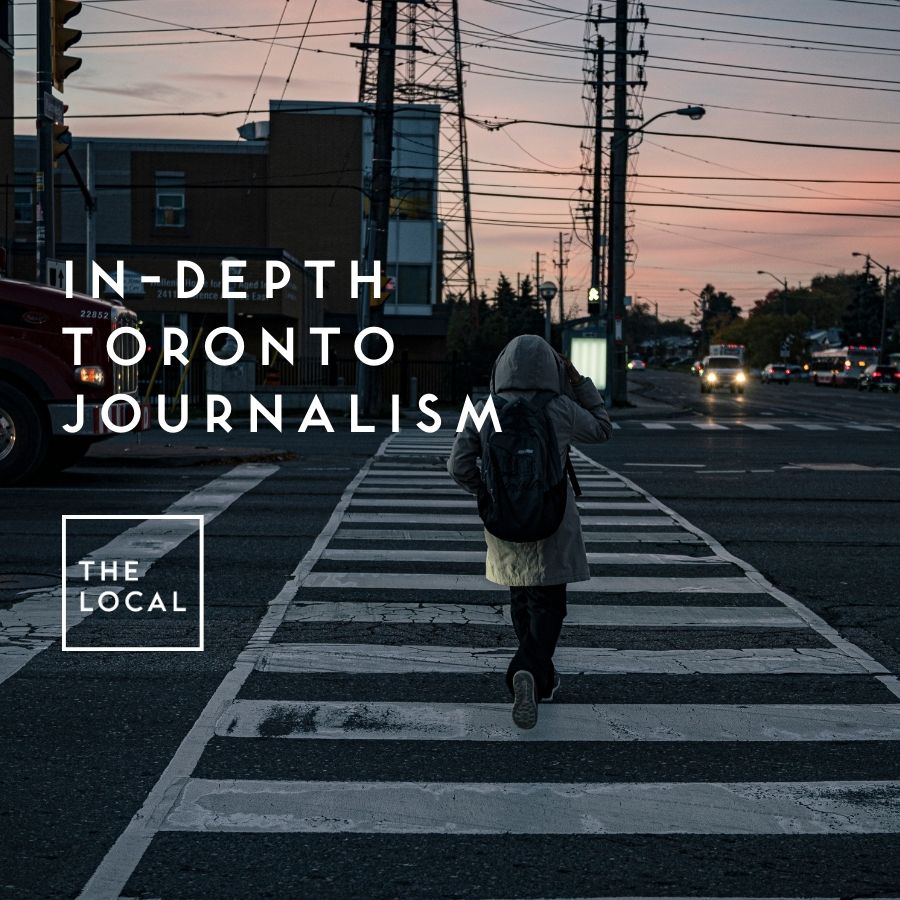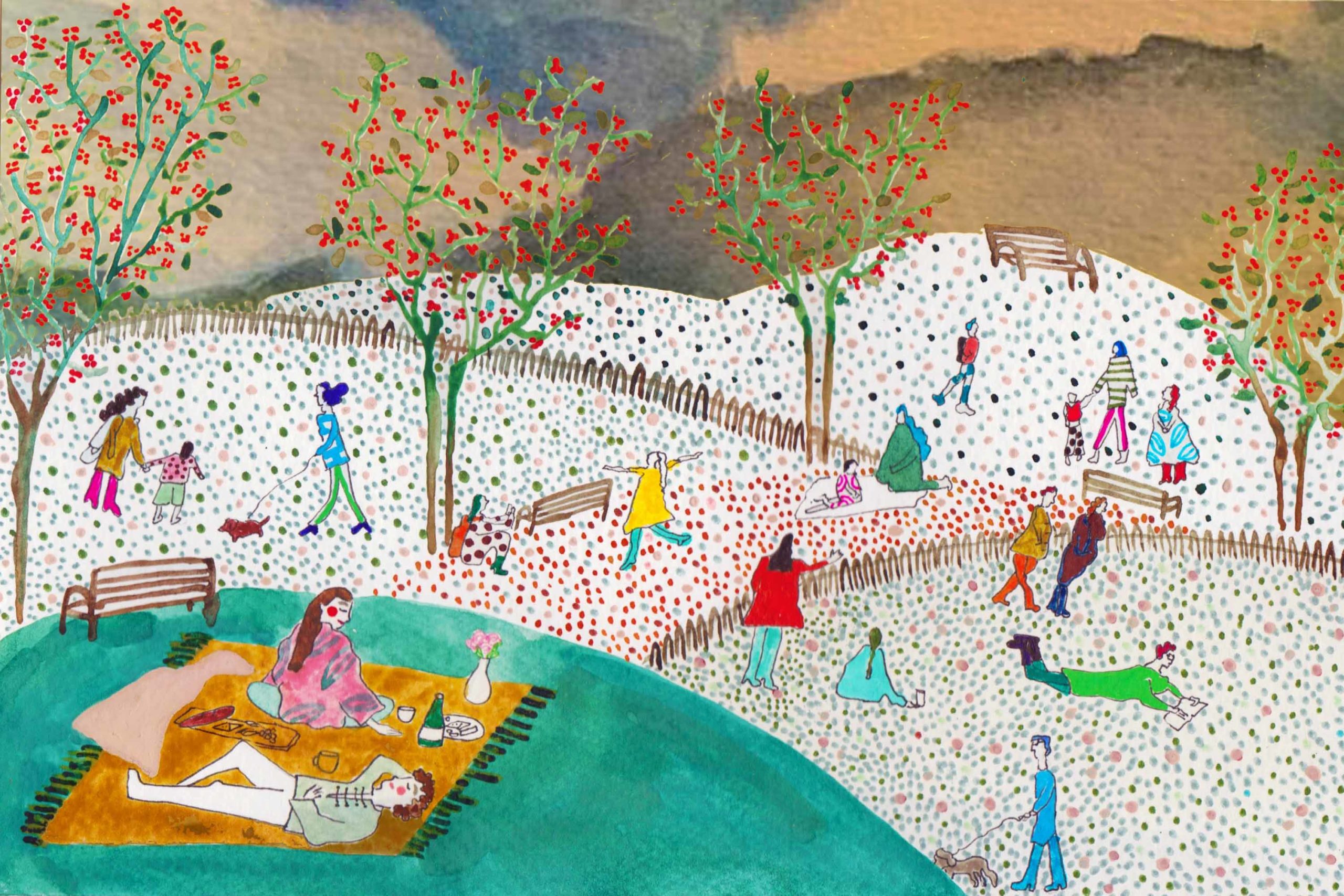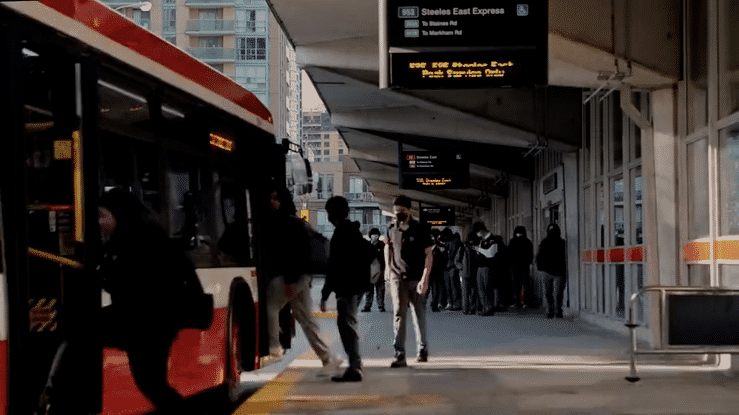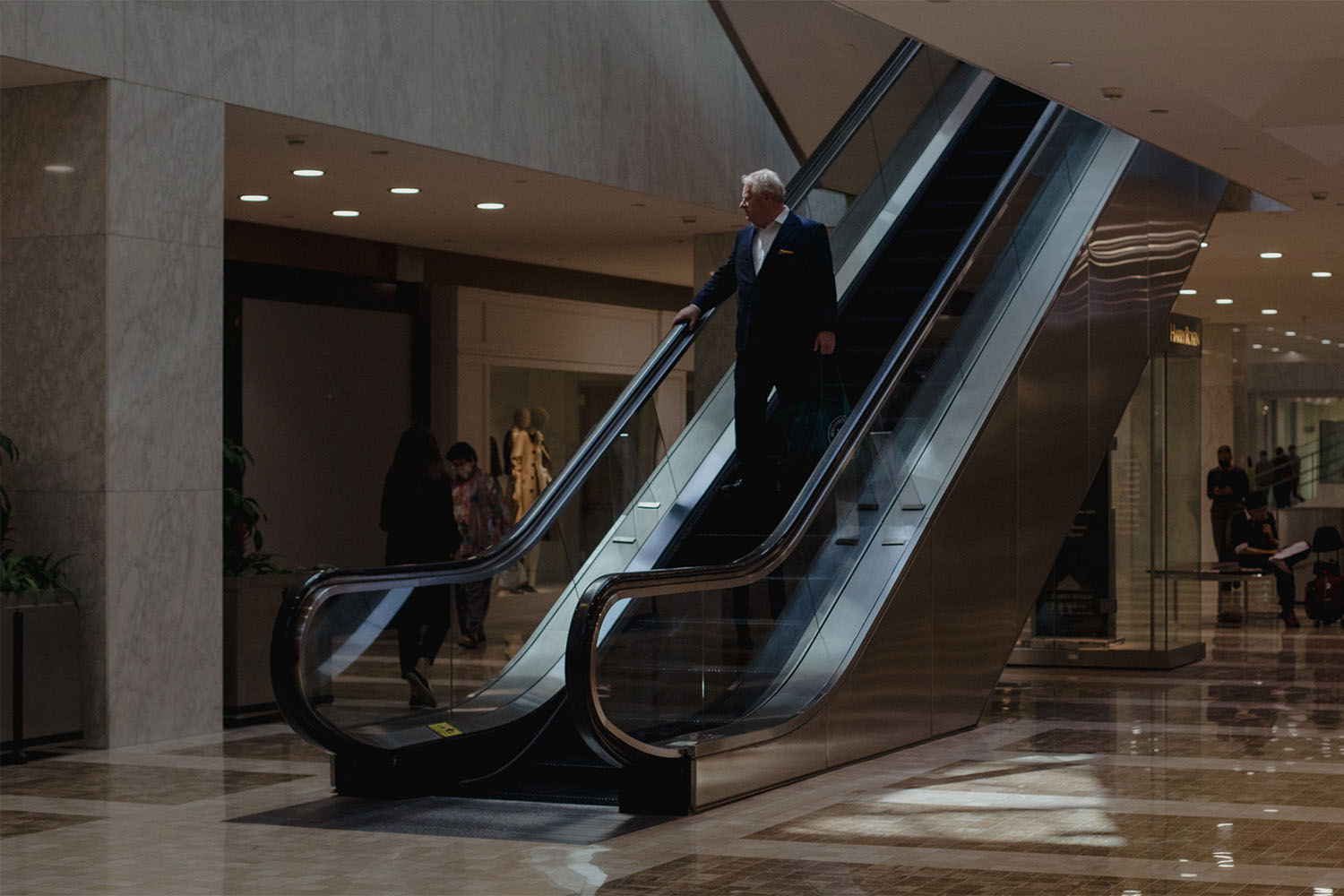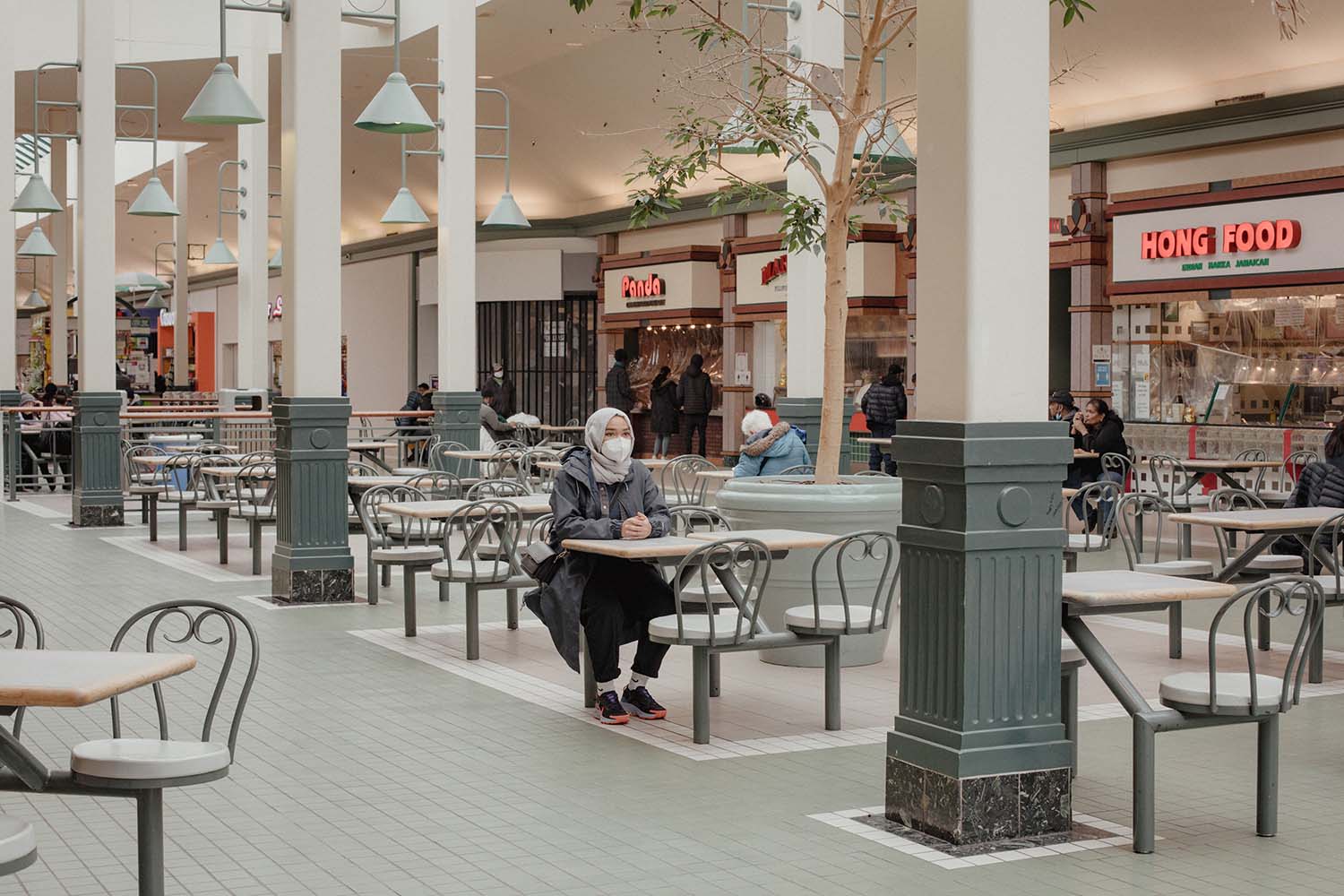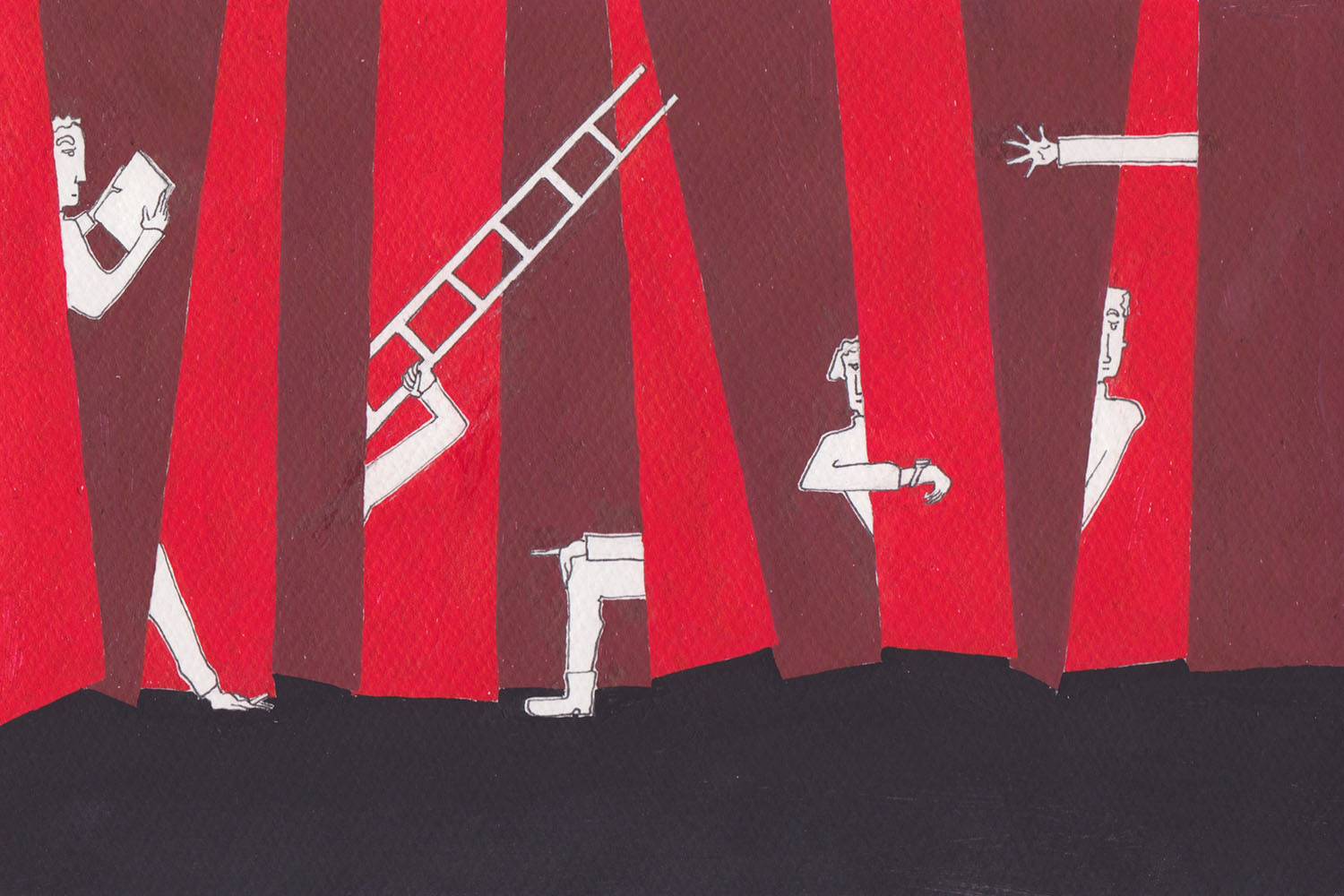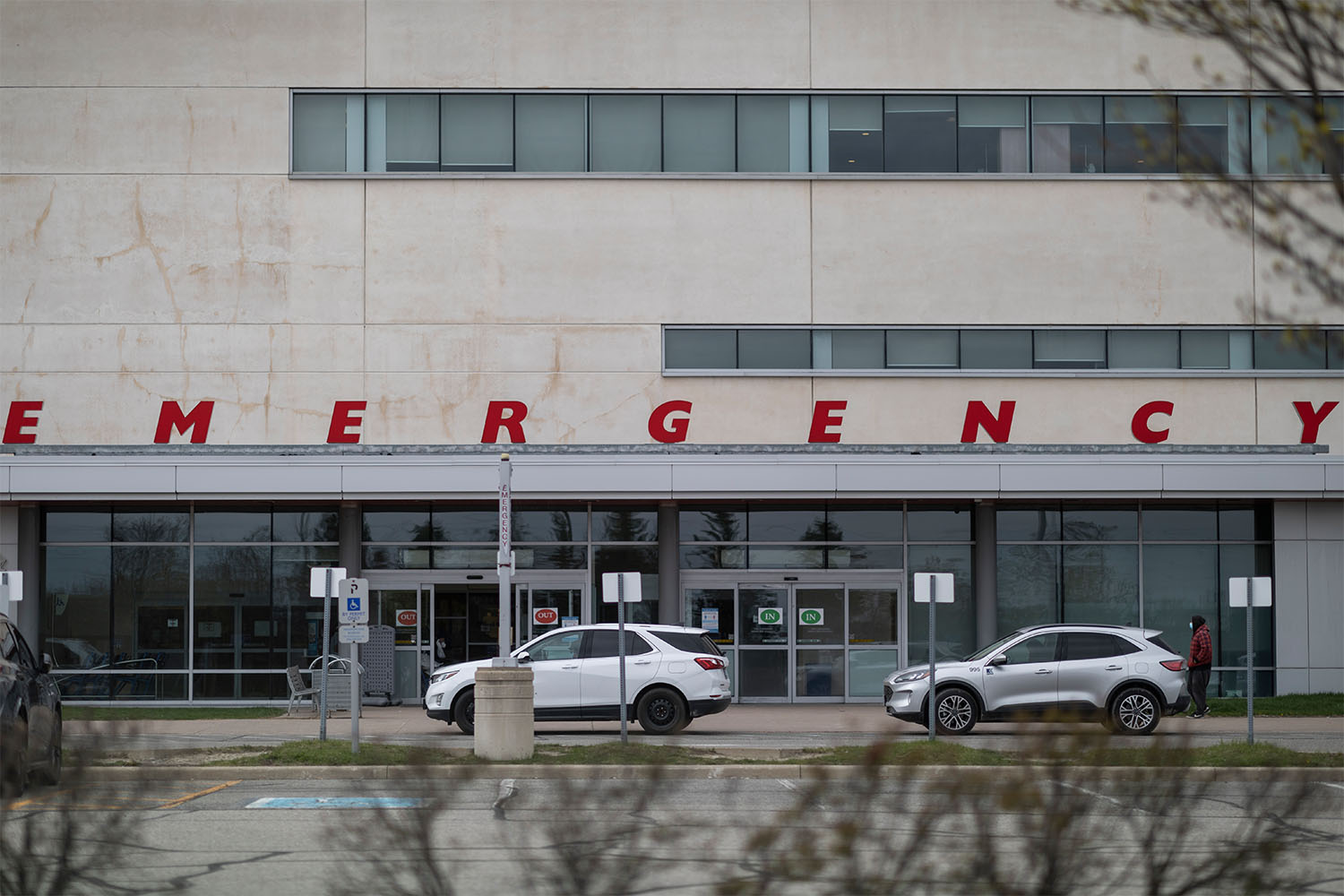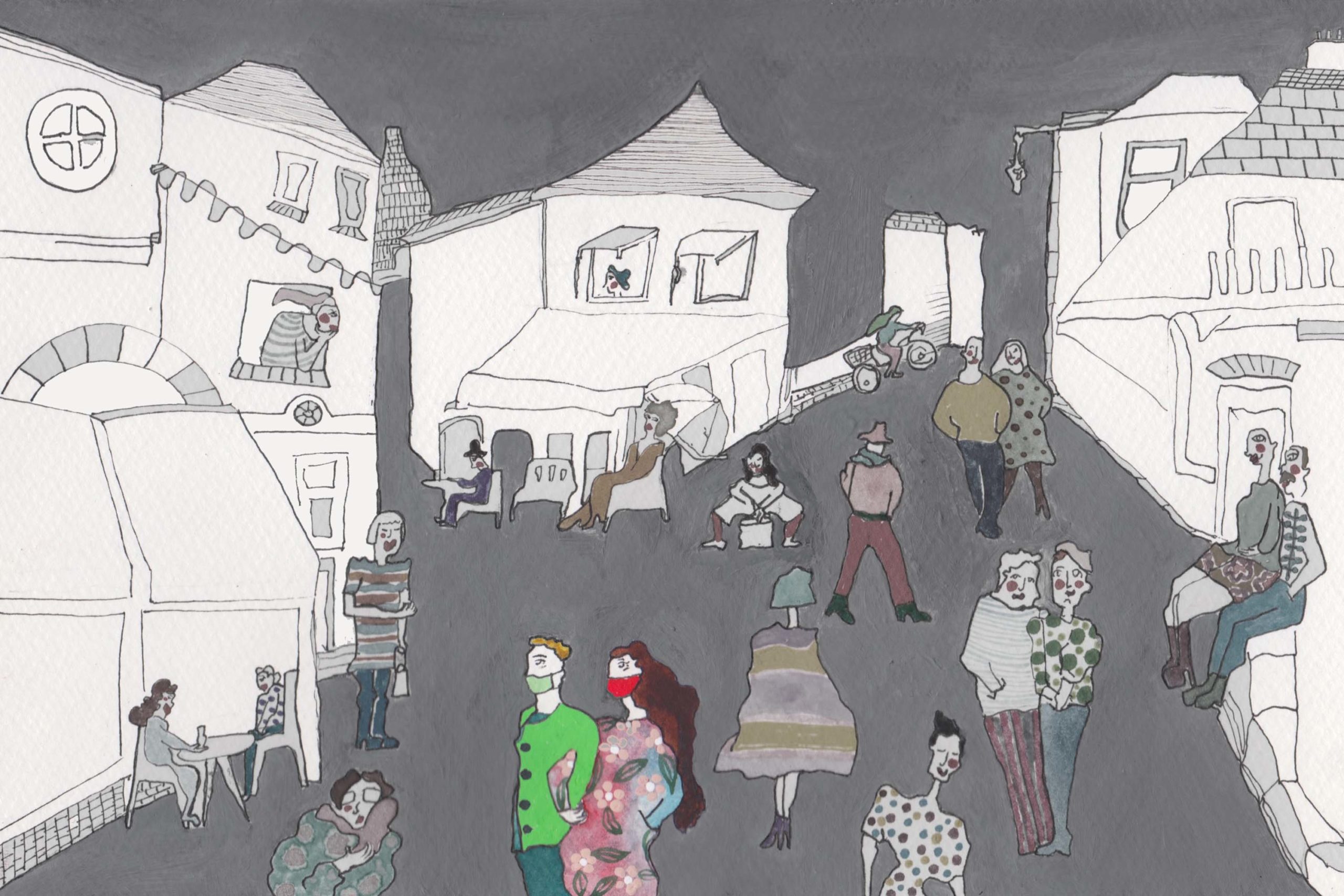
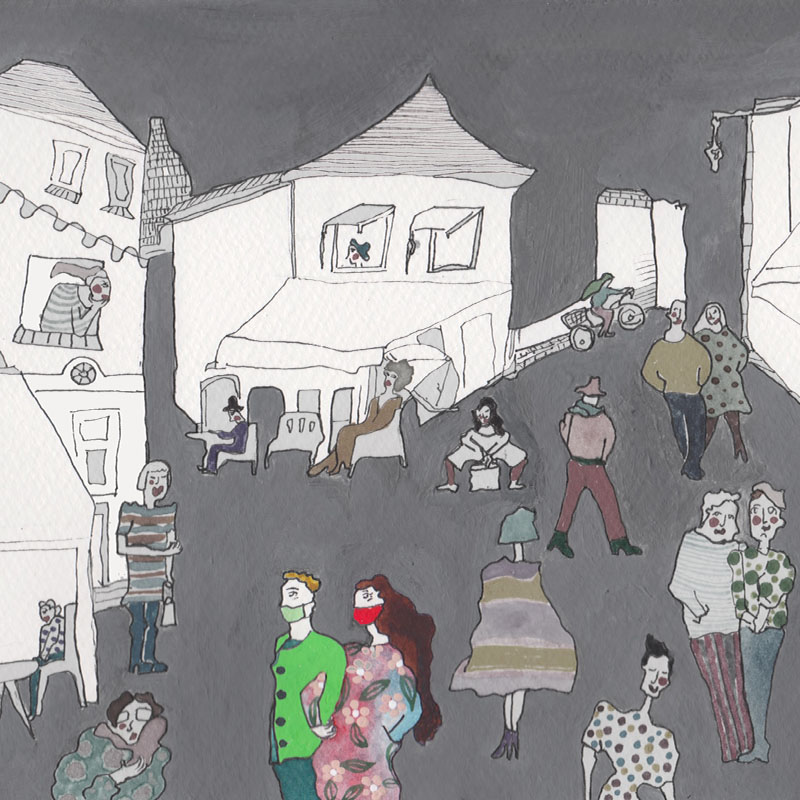
The first time I took Carlo to the hospital was two years ago, in August of 2020. This was after the province’s first wave but pre-vaccine, the summer of park beers and long walks; the flat line of case numbers was just starting to tick slightly upwards. It was early in the morning, sun searing through the curtains. For some reason I flared awake out of a dream, and when I turned to look at my partner of six years, I saw that he was already awake and staring blankly into the middle distance. His skin was so pale it looked see-through; his teeth were chattering a little. Can you feel my forehead and tell me if it’s… hot hot hot? he asked. The rhythm of this sentence is still burned into my brain. I touched him. Terror.
My father drove us to the ER. It was the first time we’d been in someone else’s car since March. We rolled down the windows; it was a beautiful day. I could not remember the last time I’d been this far downtown.
I felt panic and apprehension and also a sense of nauseous inevitability, like I was stepping into my destiny. Carlo’s immune system doesn’t work the same way as other people’s, and for the last five months I had been some weird, unnatural blend of actuary, caregiver, statistician and philosopher, trying to weigh all kinds of factors I didn’t fully understand to mitigate the risks of a situation I couldn’t possibly wrap my mind around. I knew, intellectually, that superstition is just a way to pretend you have control over situations where you have none. But deep down, I still felt like I should have seen this coming, like maybe there was something I could have done differently.
They wouldn’t let me into the hospital room with him. Too risky. I remember sitting in the waiting room, feeling panic crackle through my nerve endings every time someone pulled their mask down or coughed. The threat of COVID seemed to be everywhere; I could imagine nothing worse than him having it. When Carlo texted me and said he’d tested negative, I felt overwhelmed with relief. Then he told me they couldn’t figure out what it was at all. They monitored his levels, took his blood, kept him for a few days, and sent him home again.
Sometimes it’s just like that, he told me after, being sick. There’s so much mystery, stuff you never get to know, things that don’t get wrapped up or neatly explained. You just kinda have to keep it moving.
Overnight, the word “immunocompromised” flourished in our brains, in the news, in the mouths of politicians.
When I first met Carlo he was living in Victoria, but had come back to Toronto to spend Christmas with his family. His dad had picked him up at the airport and, when they got home, informed him that his mother had cancer and would be going for surgery in a couple of weeks. They’d been waiting until he was back to tell him. That night, after everyone went to sleep, he logged on to a dating app to distract himself. The algorithm showed him many pictures of different women, and one of them was me.
When I got to The Common for our coffee date, there was a man in a brown suede jacket sitting on the bench outside. He looked like he’d stepped out of another era, kind of a young Peter Falk vibe—handsome, rumpled, squinting at the ground. When I followed his gaze I saw that he had just spilled a full, fresh coffee right in front of him, all across the sidewalk. Sucks to be that dude, I thought, and then walked into the café to find the man I was there to meet. When he tapped me on the shoulder I could not stop myself from laughing.
We walked around Dufferin Grove, giving each other the point-form summary. At this point, Carlo had been alive for 32 years and had had three human livers in his body. The one he was born with stopped working in his mid-20s, while he was living in Montreal and being a classic Montreal guy—creative writing degree, acoustic guitar, restaurant job, shitty apartment, cool girlfriend. His vices were cigarettes and eating whole cans of Pringles for dinner; liver disease wasn’t really on the radar. But one week he started to feel a little off, and then the next week he felt worse. His eyes were getting kind of yellow in the corners, and his hands were getting callused for no reason. One night he vomited blood, and the next morning his partner took him to the ER, and then suddenly he was dying.
It took the doctors months to diagnose him with a rare liver disease. The only cure was a transplant; he shot to the top of the list because he was young and healthy, with a high chance of recovery. They installed the second liver in his body, and for a while things seemed like they were getting better. He learned to walk again, got used to the enormous scar that partitioned his torso. Then his body started to reject its new organ.
This time, he came back to Toronto, where the doctors told him he was not going to survive. He needed a transplant again, but livers are in perpetually short supply and high demand; there were many people on the list who hadn’t even had their first one yet. He’d blown his shot. For months, his loved ones would bring him to the hospital, where the staff would get him well enough to send him home to die.
One day when he was in really bad shape, just a few steps away from the end, his partner called an ambulance. Once he was in front of them, his doctors were obligated by their code of ethics to do everything they could to save his life—so when a liver suddenly became available, they had to give it to him. Right place, right time. This was how he gained his extra life, the one where I was meeting him now: algorithm of chance and fact and privilege, true love, impossible timing, ancient oath.
When I asked him whether being sick had taught him any lessons about life, he said he hated the way people always seemed to want to turn near-death experiences into inspirational stories. Like when you hear some guy talking about how he was in a car wreck, but now he climbs a new mountain a day and never takes a single thing for granted. Almost dying doesn’t automatically give your life meaning, he told me. You still have to make it for yourself.
In the first few months of falling in love, I would walk around vibrating like a dowsing rod that had found its source. I was terrified. Of what? Vulnerability, sure, and being known, and tethering my life to the life of a man whose “phone” was a Blackberry taped to a cracked iPod touch. But I was also scared that he was going to die. Not just eventually, in some abstract way, but sooner than the average person, in a manner that could be predicted but not prevented. Neither of us ever used the word immunocompromised back then, but I knew that he was on medication that disabled his immune system so his body wouldn’t know the liver was someone else’s. The pills he took were so toxic he had to wash his hands immediately after touching them; they lowered his body’s defences so effectively that even a small cut or a common cold could quickly evolve into a deadly infection. I would watch him swallow them dry by the handful and think of his ex-girlfriend, who spent years sitting beside his hospital bed while he twitched in and out on a morphine drip. I can’t do that, I’d think, and then feel ashamed for thinking it.
Subscribe
Get our latest stories delivered to your inbox.
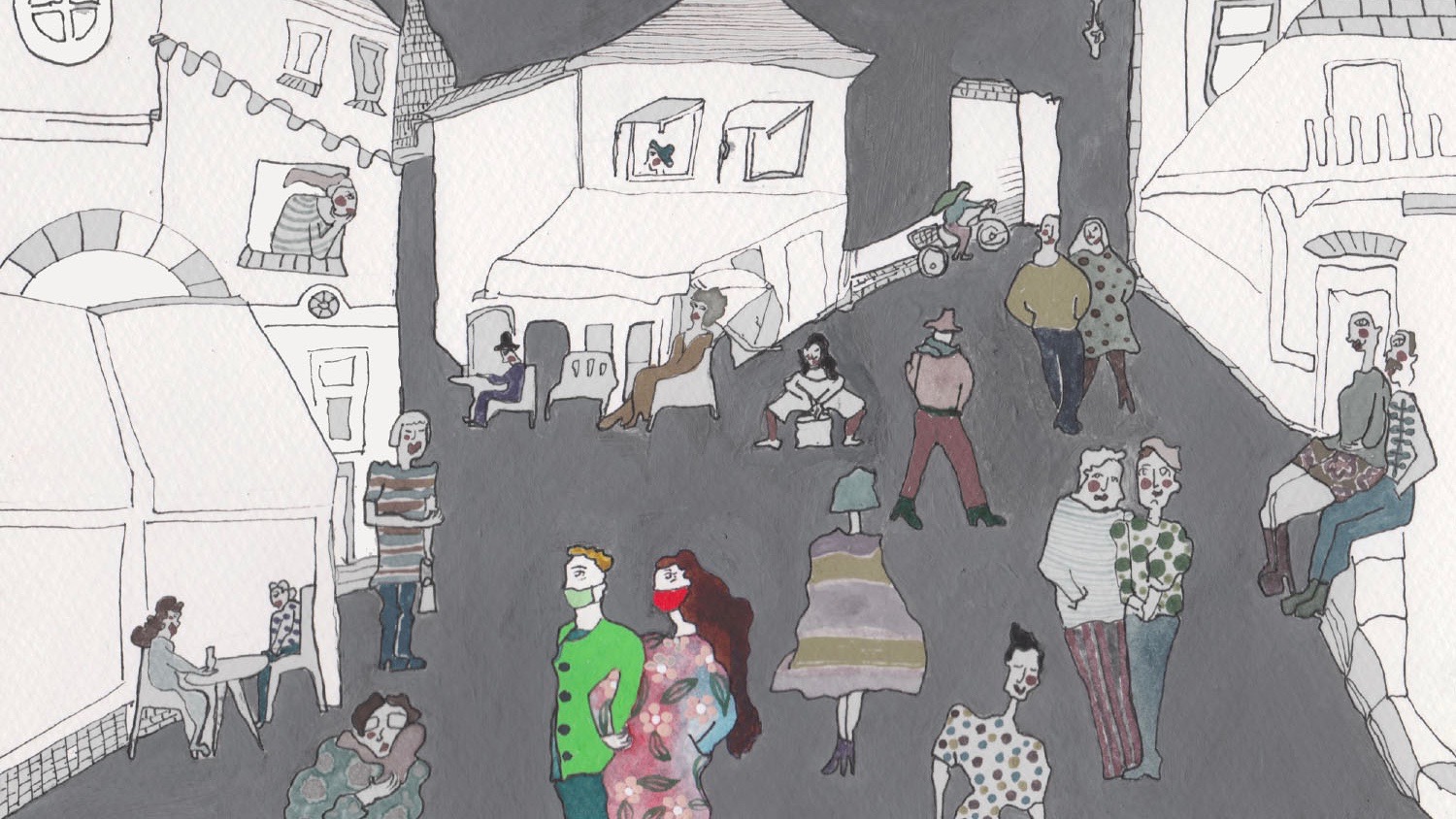
My grandma used to be terrified of saying I love you, lest God punish her hubris. You’re going to jinx it, she’d say to my mother every time she said the words to me. I grew up absorbing the lesson that a person should do whatever she could to mitigate the risks of falling in love. Now I was an adult woman with an anxiety disorder, diving headlong into a relationship where the potential for devastating loss seemed not just present but inevitable. I would lie in bed next to him and trace the scar across his stomach, feeling all that abstract danger gathered into a straight line.
Whenever I asked him how he felt about all this, his answer was always the same: You can only control what you can control. Shrugging. I could step out of the house and get hit by a bus in ten minutes. You can’t let that fear rule your life. I knew that he was right; if I was going to stay with him I needed to learn to live with the danger, assimilate it into my life while taking away some of the power it held over me. I developed a kind of spell—a list of mitigating factors I repeated to myself whenever I started to worry. He is young. He plays basketball in the park, jogs around the block, drinks water, wears sunscreen. When he gets a cold it lingers but does not lay him out.
I watched him take small, occasional, stupid, normal risks: drinking two beers at his friend’s birthday party, procrastinating over his flu shot, forgetting a doctor’s appointment. Sometimes he did get sick, and it would be scary, and then he would get better. I began to understand that on the spectrum of people with his condition, he was about as healthy as a person could be; I began to share his feeling that it was worth taking advantage of that privilege. I was getting comfortable. The fear that had once kept me up at night lowered itself, by degrees, to an ambient hum. I rode my bike, I jaywalked, I was in love with a person who had been sick and might be sick again. A risk like all the other risks I chose to live with.
Until the pandemic. Overnight, the word immunocompromised flourished in our brains, in the news, in the mouths of politicians. Carlo’s status immediately became the organizing principle of our lives, the scaffolding around which every other decision had to be made. I took a layoff from my public-facing job, we parted ways with our roommate and stopped seeing family or friends. In those early days I would come home from a terrifying trip to pick up milk at the corner store, kiss him, and then spend the next few hours rigid with anxiety that I had killed the person I loved by bringing the outside world in.
Carlo took his fear and stored it somewhere deeper. When I asked him how he was feeling about everything he would say fine, good, whatever. His job let him work from home; he was healthy and comfortable. I’m not exactly itching to call myself disadvantaged, I heard him say to a friend on the phone. But when we went out for walks at night he would cross to the other side of the street every time we saw another person. We started having small, pointless fights every time I got back from the grocery store; my frustration at suddenly being his caretaker chafing against his frustration at suddenly needing one.
As the parameters of the virus came into focus, we found ourselves asking endless questions about risk for which no one could give us a clear answer. Is it okay to see a friend? Two friends? To sit around a fire in their backyard? To go to the corner store? To visit our parents? Advice from his doctors, like the advice from the government, was vague and constantly shifting. All life felt unsteady, every decision a minefield. Like everyone else, we made our decisions based on a patchwork of calculations that were logically inconsistent but made sense to us, trying to balance the physical risks of potential illness with the mental health risks of living in isolation.
During this period, I would stay up until 4:00 a.m. searching different versions of the same idea: transplant patients covid risk. Covid transplant patient danger. I’d read abstracts in medical journals, trying to decode jargon that meant nothing to me, zooming in on little graphs that pixelated into meaninglessness on my phone screen. Every once in a while, I would see an article pop up about the plight of immunocompromised people and click on it, hoping to gather some concrete information about what we could and couldn’t do.
But the articles were always just about how people like Carlo were all paralyzed with terror, scared they’d never be able to leave their homes or see their families again. None of them reported on those people missing the freedom to make small, bad decisions; none of them talked about what it might mean to be at greater risk of catching the virus and still want to live a life where you could go outside, or see people, or make a small decision that might open you up to the world. If people were making those types of decisions, it wasn’t newsworthy. We were on our own.
The safety net that was supposed to protect us during previous waves—already so thin that it often seemed practically useless—has completely dissolved.
The second time I had to take Carlo to the hospital was last month. He had all the same symptoms as he did the first time, two summers ago: the chills, the nausea, the fever. My mother drove us to the ER this time; we took the same route to get there, made the same small talk to cover up the fear.
Nothing about the hospital waiting room had changed except the questions on the COVID screening, which were more precise. The Coke machine in the triage area still had an enormous sticker that said THANK YOU!! on it; I stared at it for over an hour after they brought him inside while I waited to be told what would come next.
I tried to line my life up with the life I’d had the last time I’d been here. Some things were different, while others hadn’t changed at all. We’d gotten married, in a season when cases were low enough that we could gather 20 people without too much anxiety. Carlo still works remotely; he was the first person I know to get four vaccines. I take the subway now and do not flinch like I used to when people pull down their masks, or forgo them entirely, or cough—maybe because I feel protected, or maybe because I’m used to it, or maybe because I’m tired.
I work retail again. I started in the fall, and stopped when Omicron hit, then started again in the new year. We still ask customers to mask inside our store, even though the mandate’s been lifted. Once or twice a day, a guy in wraparound sunglasses or a woman with pursed lips will yell at me that I have no right to tell them what to do, or that what I’m asking them is wrong. The rage these people feel is incomprehensible to me—not because I disagree with them, but because after years of testing for potential danger in every decision and never coming up with a clear answer, I feel incapable of summoning any type of anger over the idea that the virus might impact my personal life. When I try to call up my own fury to throw back at them, all I can find is a blank, airy space where the feeling should be, like I’m looking at the situation from a great height, all these different factors abstracted into meaninglessness. The strongest feeling I can muster is the desire to be free of all these questions for which there are no answers. What’s next?, a red-faced man asked me last week, literally spitting mad. Should we all be wearing helmets and goggles forever?
I don’t know, I sighed, maybe, and meant it.
After Carlo’s rapid test came back negative, they let me into the hospital to be with him. Just like before, they couldn’t say what was wrong, but this time they had a theory. If they were correct it might not be so bad. We just needed to wait for a few more days, or maybe weeks. After three days in the transplant ward they sent him back out into the world with no answers, just a few scraps of fact to hold onto and the promise of more, maybe, eventually.
We were both freaked out by the experience. It was a brush up against a kind of limitless fear that neither of us knows exactly what to do with, besides admitting to its presence and then continuing to live like it doesn’t matter. No one can tell us how scared we’re supposed to be, or what we should do next.
This uncertainty feels uncannily reflected in the world around us. Right after we left the hospital, the province started to surge into its murky, perplexing sixth wave. Cases might be the highest they’ve been, or maybe they’re just really, really high; there is less data available to us than ever before about what kind of risk we might be putting ourselves in by going out in public. At the same time, the city around us is more open than ever. The safety net that was supposed to protect us during previous waves—already so thin that it often seemed practically useless—has completely dissolved.
So what are we going to do about it? Nothing, I guess, except the really obvious stuff; we’re not going to any raves or orgies anytime soon. But in the end, you have to live. I go to work, and he plays pickup basketball with his vaccinated friends once a week, and if the bus is too crowded I cross my fingers and try to forget about it. Sometimes we have a few people over and sometimes we ask them to test and sometimes it doesn’t feel necessary. Our friends invite us to parties and shows and restaurants that sometimes they themselves feel unsure about attending. Like us, they aren’t really sure what to do with their uncertainty besides acknowledge it and try to keep going. We are all making our decisions the same way—with one eye on the news and no idea what the rules should be. We talk about the summer, when maybe we can do things outside, feel the grip of all this worry loosen a little. Is this the right thing to do, or the only thing? I keep trying to remember that our lives have always been this way, just with different kinds of danger. It’s like falling in love, I tell myself. The calculus of risk, the never-ending mystery.
